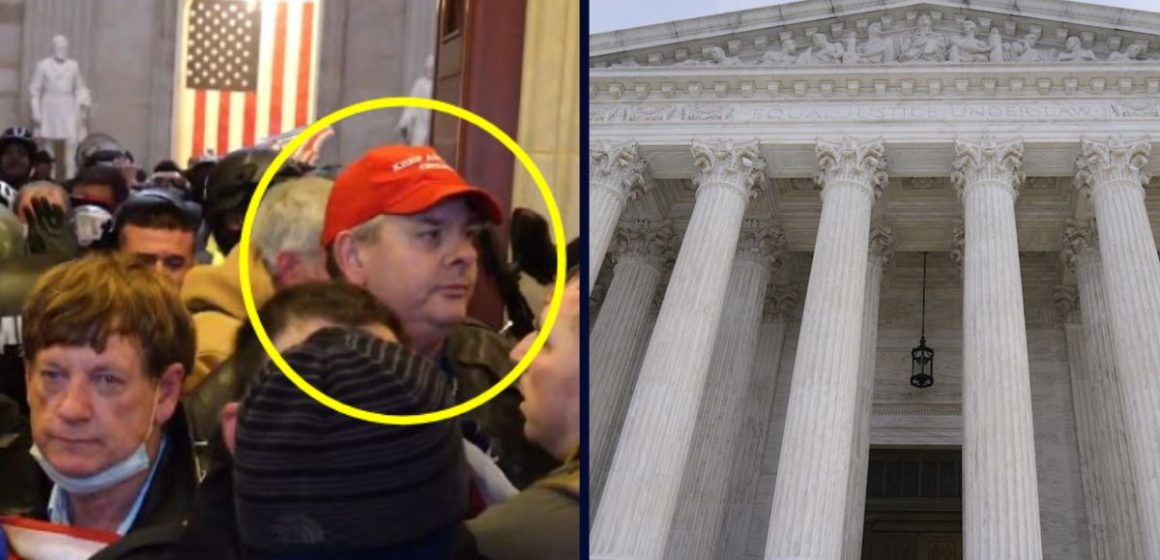The U.S. Supreme Court declined to hear an appeal by a Jan. 6 defendant who challenged a charge for “parading, picketing or demonstrating in a Capitol building,” making the lower court’s decision the final ruling on the matter.
The case centers around John Maron Nassif, 57, of Florida, who was arrested in 2021 and then convicted in 2022 on charges that he entered and remained on restricted grounds at the Capitol. While there, he led a chant to a crowd yelling, “Whose House?” and then shouted back, “Our House!”
He was also convicted of other misdemeanors, including disorderly and disruptive conduct in a restricted building, violent entry in a Capitol building and parading and demonstrating or picketing in a Capitol building.
He was sentenced to seven months in prison, served his time and was released in January. He appealed his conviction and argued at length that the charge of parading and picketing was overbroad and unconstitutional.
The judge who convicted Nassif at a bench trial, U.S. District Judge John Bates, an appointee of former President George W. Bush, rejected Nassif’s attempt to dismiss the parading charge pretrial.
He found that historically, courts had ruled that the interior of the Capitol is a “nonpublic forum” where the federal government “may limit First Amendment activities so long as the restrictions are ‘reasonable in light of the purpose of the forum and are viewpoint neutral,” Bates’ opinion explained.
Bates noted that the Supreme Court previously identified only three types of public property for First Amendment analysis: the traditional public forum, like streets or parks; a designated public forum; and the nonpublic forum.
With his motion, Bates wrote that Nassif would have the court only focus on the words “parade, demonstrate and picket” in the statute instead of the six operative words that follow it: “in any of the Capitol buildings.”
While the seat of the legislative branch of the federal government “might well be considered to be the heart of the nation’s expressive activity and ideas,” Bates said, it has also long been understood that the expression of ideas comes with limitations “in order to permit Congress peaceably to carry out its lawmaking responsibilities and to permit citizens to bring their concerns to their legislators.”
When Nassif took his case to the U.S. Court of Appeals for the District of Columbia and tried to unwind the parading, picketing or demonstrating charge, he was, once again, unpersuasive.
In its ruling in April, a three-judge appellate of U.S. Circuit Judges Cornelia Pillard, Robert Wilkins — both Barack Obama appointees — and Bradley Garcia, appointed by Joe Biden, emphasized that Nassif’s arguments ignored the strict regulations the public must typically observe to access the Capitol.
While Nassif never argued that his conduct in the Capitol on Jan. 6 was protected, nor did he say he received insufficient notice that his conduct was prohibited, the appeals court found that he did incorrectly contend that the picketing statute under Section 5104(e)(2)(G) was “so unclear that it is entirely invalid and cannot be applied to anyone, including him.”
Nassif also claimed that the Capitol Rotunda, for example, was an open forum intended for assembly, but the appeals court found there was not strong enough evidence to support this.
Hearings, meetings, and lobbying sessions that take place, for example, in the Capitol, are not always open to the public. Also, physical entry points to the Capitol are not all open to the public. Items must be subject to inspection, appointments for visitors must be made, and security screenings are also required, to name but a few examples.
To support his arguments, Nassif referred the appeals court to 1934 civil rights sit-ins at whites-only restaurants within the Capitol protests in the 1990s inside the building in support of the Americans with Disabilities Act.
But the court was succinct: two examples over 90 years do not make a convincing argument. Neither example, Pillard wrote, involved an “intentional choice by the government to open the Capitol as a public forum.”
There may be a future case where there is a designated public forum somewhere inside the Capitol, she said.
But the current record supported no such characterization. Also, it was members of Congress who “reasonably decided” that parading, picketing or demonstrating inside their workplace would interfere with their duties. They also understood that Capitol police officers must prioritize safeguarding lawmakers, not policing pickets or demonstrations.
“To be sure, ‘[t]he fundamental function of a legislature in a democratic society assumes accessibility to [public] opinion. But the interest in a workplace where legislators and staff may do their jobs undisturbed by parades, pickets, or demonstrations comports with accessibility and is plainly legitimate,” Pillard wrote.
In the 46 months since the Capitol attack, 1,561 people have been charged with crimes associated with it, authorities said. Illegal parading and picketing are among the most common charges and convictions for Jan. 6 defendants.
Brandi Buchman contributed to this report.
Have a tip we should know? [email protected]
Note: Thank you for visiting our website! We strive to keep you informed with the latest updates based on expected timelines, although please note that we are not affiliated with any official bodies. Our team is committed to ensuring accuracy and transparency in our reporting, verifying all information before publication. We aim to bring you reliable news, and if you have any questions or concerns about our content, feel free to reach out to us via email. We appreciate your trust and support!



Leave a Reply